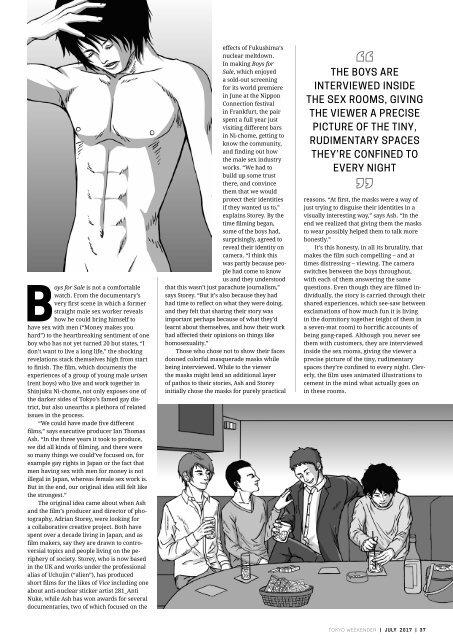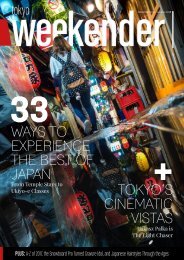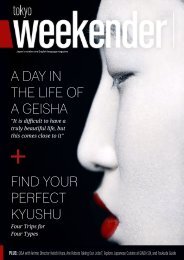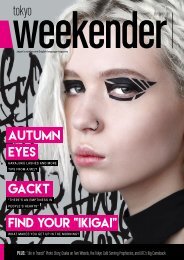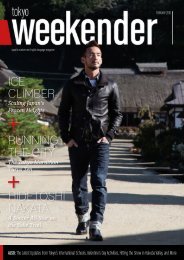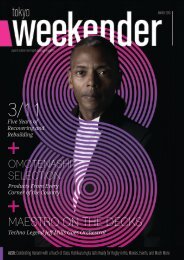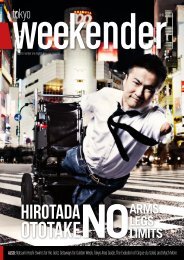Tokyo Weekender July 2016
Breaking the rules of kimono – a new book shatters antiquated views of this traditional garment. Plus: The boys for sale in Shinjuku Ni-chome, best sake of 2017, Japan's new emperor, and what really goes on inside "Terrace House."
Breaking the rules of kimono – a new book shatters antiquated views of this traditional garment. Plus: The boys for sale in Shinjuku Ni-chome, best sake of 2017, Japan's new emperor, and what really goes on inside "Terrace House."
You also want an ePaper? Increase the reach of your titles
YUMPU automatically turns print PDFs into web optimized ePapers that Google loves.
Boys for Sale is not a comfortable<br />
watch. From the documentary’s<br />
very first scene in which a former<br />
straight male sex worker reveals<br />
how he could bring himself to<br />
have sex with men (“Money makes you<br />
hard”) to the heartbreaking sentiment of one<br />
boy who has not yet turned 20 but states, “I<br />
don’t want to live a long life,” the shocking<br />
revelations stack themselves high from start<br />
to finish. The film, which documents the<br />
experiences of a group of young male urisen<br />
(rent boys) who live and work together in<br />
Shinjuku Ni-chome, not only exposes one of<br />
the darker sides of <strong>Tokyo</strong>’s famed gay district,<br />
but also unearths a plethora of related<br />
issues in the process.<br />
“We could have made five different<br />
films,” says executive producer Ian Thomas<br />
Ash. “In the three years it took to produce,<br />
we did all kinds of filming, and there were<br />
so many things we could’ve focused on, for<br />
example gay rights in Japan or the fact that<br />
men having sex with men for money is not<br />
illegal in Japan, whereas female sex work is.<br />
But in the end, our original idea still felt like<br />
the strongest.”<br />
The original idea came about when Ash<br />
and the film’s producer and director of photography,<br />
Adrian Storey, were looking for<br />
a collaborative creative project. Both have<br />
spent over a decade living in Japan, and as<br />
film makers, say they are drawn to controversial<br />
topics and people living on the periphery<br />
of society. Storey, who is now based<br />
in the UK and works under the professional<br />
alias of Uchujin (“alien”), has produced<br />
short films for the likes of Vice including one<br />
about anti-nuclear sticker artist 281_Anti<br />
Nuke, while Ash has won awards for several<br />
documentaries, two of which focused on the<br />
effects of Fukushima’s<br />
nuclear meltdown.<br />
In making Boys for<br />
Sale, which enjoyed<br />
a sold-out screening<br />
for its world premiere<br />
in June at the Nippon<br />
Connection festival<br />
in Frankfurt, the pair<br />
spent a full year just<br />
visiting different bars<br />
in Ni-chome, getting to<br />
know the community,<br />
and finding out how<br />
the male sex industry<br />
works. “We had to<br />
build up some trust<br />
there, and convince<br />
them that we would<br />
protect their identities<br />
if they wanted us to,”<br />
explains Storey. By the<br />
time filming began,<br />
some of the boys had,<br />
surprisingly, agreed to<br />
reveal their identity on<br />
camera. “I think this<br />
was partly because people<br />
had come to know<br />
us and they understood<br />
that this wasn’t just parachute journalism,”<br />
says Storey. “But it’s also because they had<br />
had time to reflect on what they were doing,<br />
and they felt that sharing their story was<br />
important perhaps because of what they’d<br />
learnt about themselves, and how their work<br />
had affected their opinions on things like<br />
homosexuality.”<br />
Those who chose not to show their faces<br />
donned colorful masquerade masks while<br />
being interviewed. While to the viewer<br />
the masks might lend an additional layer<br />
of pathos to their stories, Ash and Storey<br />
initially chose the masks for purely practical<br />
THE BOYS ARE<br />
INTERVIEWED INSIDE<br />
THE SEX ROOMS, GIVING<br />
THE VIEWER A PRECISE<br />
PICTURE OF THE TINY,<br />
RUDIMENTARY SPACES<br />
THEY’RE CONFINED TO<br />
EVERY NIGHT<br />
reasons. “At first, the masks were a way of<br />
just trying to disguise their identities in a<br />
visually interesting way,” says Ash. “In the<br />
end we realized that giving them the masks<br />
to wear possibly helped them to talk more<br />
honestly.”<br />
It’s this honesty, in all its brutality, that<br />
makes the film such compelling – and at<br />
times distressing – viewing. The camera<br />
switches between the boys throughout,<br />
with each of them answering the same<br />
questions. Even though they are filmed individually,<br />
the story is carried through their<br />
shared experiences, which see-saw between<br />
exclamations of how much fun it is living<br />
in the dormitory together (eight of them in<br />
a seven-mat room) to horrific accounts of<br />
being gang-raped. Although you never see<br />
them with customers, they are interviewed<br />
inside the sex rooms, giving the viewer a<br />
precise picture of the tiny, rudimentary<br />
spaces they’re confined to every night. Cleverly,<br />
the film uses animated illustrations to<br />
cement in the mind what actually goes on<br />
in these rooms.<br />
TOKYO WEEKENDER | JULY 2017 | 37


